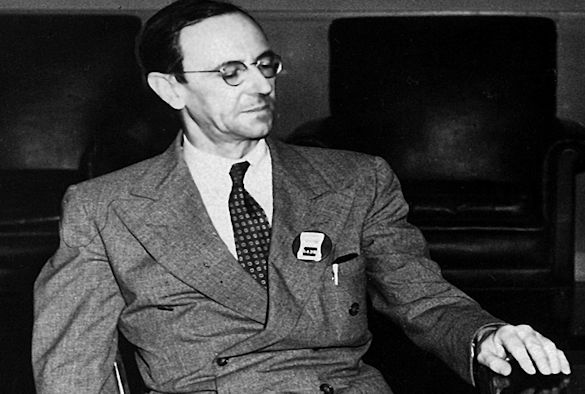Happy Birthday Sir James Chadwick
Published on

Professor Carsten Welsch, Head of the University's Department of Physics, pays tribute to Sir James Chadwick on the 125th anniversary of his birthday:
"Thursday 20th October marks the 125th birthday of Sir James Chadwick, Professor and Lyon Jones Chair of Physics at Liverpool University from 1935 – 1948.
Nobel Prize in Physics
Chadwick is most well-known for his discovery of neutrons, elementary particles devoid of any electrical charge, in 1932 for which he was awarded the Nobel Prize in Physics in 1935. Chadwick’s discovery built on prior research by Becker and Bothe who had measured strong radiation emission from beryllium atoms that had been bombarded with alpha particles (Helium Nuclei). Becker and Bothe had hypothesised that this was high energy electromagnetic radiation however Chadwick proved that the emission was instead a neutral particle with almost the same mass as a proton which was soon after named, the neutron.
In contrast with the positively charged alpha particles which are repelled by the substantial electrical forces of the nuclei of heavy atoms, the neutron became a new method of atomic disintegration. Having no charge there is no electric barrier to overcome and a neutron is capable of penetrating and splitting the nuclei of heavy elements. This initially paved the way towards the fission of uranium 235 and towards the creation of the atomic bomb and nuclear power. For this discovery he was also awarded the Hughes Medal of the Royal Society in 1932 and then additionally, his 1935 Nobel Prize.
Chadwick followed the discovery of the neutron by measuring its mass, and anticipated that neutrons would become a major weapon in the fight against cancer. Chadwick received a knighthood in 1945 for his outstanding work.
Background and Other Research
Chadwick, born in Cheshire, England graduated from Manchester University, Honours School of Physics in 1911 and went on to research radioactivity in Manchester’s Physical Laboratory under Professor Rutherford before gaining his M.Sc. in 1913.
Chadwick spent some years during World War I interned in the Zivilgefangenenlager, Ruhleben, before returning to England when the war had ended. He then joined Rutherford at the Cavendish Laboratory, Cambridge, working on breaking apart light elements by bombardment of alpha particles. In 1923 Chadwick became assistant director of Research for the Cavendish Laboratory where he remained until 1935 before coming to Liverpool.
Chadwick and the University of Liverpool
On arrival at Liverpool Chadwick enhanced the Physics Department’s level of research by constructing a cyclotron, a circular particle accelerator using money funded from the Royal Society. Chadwick enlisted the help of John Cockcroft a pioneer in accelerator science.
This newly installed cyclotron made Liverpool an important centre for the study of nuclear physics. Therefore, the current status of the University of Liverpool as one of the world’s leading institutions in nuclear, particle, and accelerator physics draws directly from Chadwick’s work.
Some years later Cockroft (the futre Sir Cockroft) was also a Nobel Prize winner which he shared with Ernest Walton for the splitting of the atomic nucleus. The Cockcroft institute is an international centre for Accelerator Science and Technology (AST) in the UK opened in 2006 and in elegant echo of the important relationship between Chadwick and Cockroft, closely affiliated with Liverpool University.
As well as his significant contributions to modern Physics, Chadwick had a massive impact on Liverpool University’s Department of Physics, from the building and lecture theatre that bears his name to its position as an international hub for the training of scientists, through international projects coordinated by Liverpool such as oPAC, LA3NET, OMA or our brand-new AVA, Chadwick’s legacy lives on.
Happy Birthday Sir James Chadwick!"
https://www.nobelprize.org/nobel_prizes/physics/laureates/1935/chadwick-facts.html
https://www.nobelprize.org/nobel_prizes/physics/laureates/1935/chadwick-bio.html
http://www-outreach.phy.cam.ac.uk/camphys/physicists/physicists_chadwick.htm